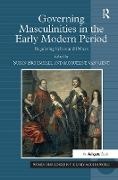Read more
Documenting lived experiences of men in charge of others, this collection creates a social and cultural history of early modern governing masculinities. Through a wide range of case studies, contributors explore what distinctions can be seen in ideas of authoritative masculine behaviour across Protestant and Catholic cultures, British and Continent
List of contents
Introduction; 1: Civic Manliness in London, c. 1380–1550; 2: Masculine Republics: Establishing Authority in the Early Modern Venetian Printshop; 3: Jean Martin, Governor of the Grand Bureau des Pauvres, on Charity and the Civic Duty of Governing Men in Paris, c. 1580; 4: Codpieces and Potbellies in the Songes drolatiques: Satirizing Masculine Self-Control in Early Modern France and Germany; 5: The Obligations of Governing Masculinity in the Early Stuart Gentry Family: The Barringtons of Hatfield Broad Oak; 6: Militant Masculinity and the Monuments of Westminster Abbey; 7: Between Corporate and Familial Responsibility: Johan Maurits van Nassau-Siegen and Masculine Governance in Europe and the Dutch Colonial World; 8: Raiding the Patriarch's Toolbox: Reading Masculine Governance in Cases of Male Witchcraft, 1592–1692; 9: Side-wounds, Sex, and Savages: Moravian Masculinities and Early Modern Protestant Missions; 10: Alternative Hierarchies: Manhood and Unbelief in Early Modern Europe, 1660–1750; 11: Men Controlling Bodies: Medical Consultation by Letter in France, 1680–1780; 12: Attitudes towards Male Authority and Domestic Violence in Eighteenth-Century London Courts; 13: Policing Bodies in Urban Scotland, 1780–1850
About the author
Susan Broomhall is Professor of Early Modern History at The University of Western Australia. Jacqueline Van Gent is Senior Lecturer in Gender Studies at The University of Western Australia.
Summary
Documenting lived experiences of men in charge of others, this collection creates a social and cultural history of early modern governing masculinities. Through a wide range of case studies, contributors explore what distinctions can be seen in ideas of authoritative masculine behaviour across Protestant and Catholic cultures, British and Continent

